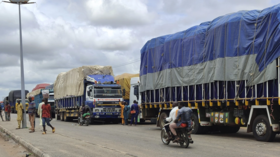West African sanctions blocking food and aid from reaching Niger – Reuters

Thousands of trucks carrying food bound for Niger have been stuck for weeks at the Malanville crossing in northern Benin due to border closures and sanctions imposed on the new military government in Niamey, Reuters reported on Thursday.
Benin’s Malanville checkpoint is said to be one of the busiest in West Africa, with a high volume of transit goods, including humanitarian aid products passing through into neighboring Niger.
Traffic at the crossing is reportedly at a standstill, with a line of loaded trucks stretching back 25 kilometers "from the muddy shores of the Niger River that marks the frontier,” Reuters reported. Some small traders are said to be using wooden boats to transport goods across the river into the country, evading border guards.
"We don't know if we've been taken hostage or what," a Nigerien driver told the agency, who said he had been stranded at the border with his cargo of sugar and oil for more than 20 days. "There's no food, there's no water, there's nowhere to sleep," he added.
The Economic Community of West African States (ECOWAS) restricted financial transactions and blocked entry into Niger from its member states in order to force the July 26 coup plotters to reinstate ousted president Mohamed Bazoum.
The World Food Programme (WFP) warned last week that the blockade was "greatly affecting the supply of vital foods and medical supplies into Niger," where it claimed at least 3.3 million people were already "acutely food-insecure" prior to the coup.
Margot van der Velden, the UN food agency’s acting regional director for Western Africa, has urged “all parties to facilitate humanitarian exemptions, enabling immediate access to people in need of critical food and basic necessities.”
The WFP’s West African regional spokesperson, Djaounsede Madjiangar, has also told the media that about 6,000 tonnes of goods from the agency, including cereals, cooking oil, and food for malnourished children, are stuck outside Niger.
Businesses in the country’s southern neighbor, Nigeria, have expressed concern about the impact of the sanctions on cross-border trade. Some residents told the Associated Press that business owners have taken advantage of the border closure to raise the prices of goods.













